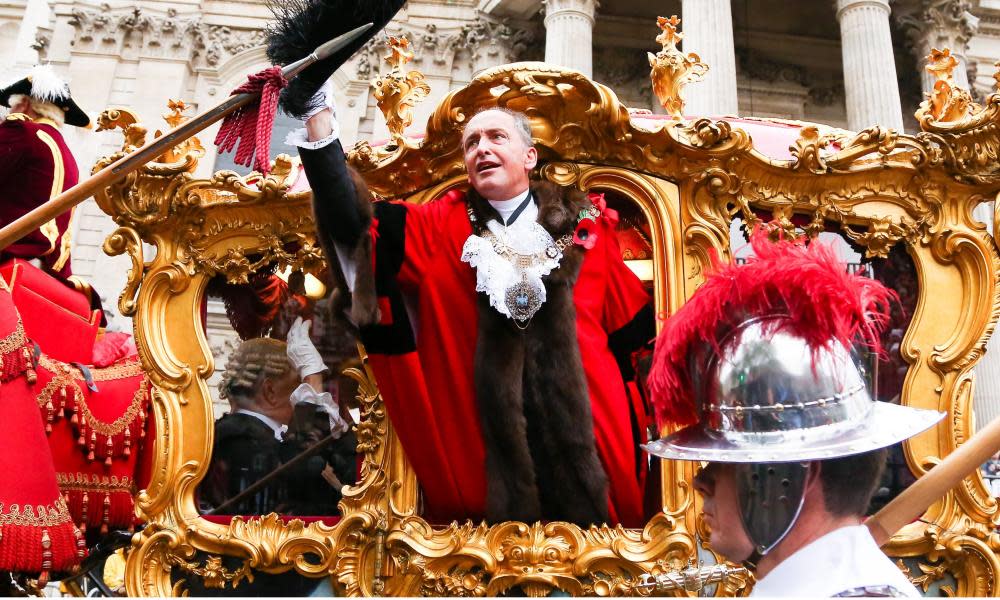Outrage at ‘lavish’ spending by City of London Corporation

The secretive local authority that runs London’s Square Mile has come under fire for “lavish” spending – including subsidising its own members’ club and supporting a trio of private schools – at a time when funding for vital public services has been slashed.
The Labour party said the City of London Corporation was now in “desperate need of reform” after figures obtained by the Observer detailed spending on a luxurious dining club and bar, grace-and-favour accommodation and multimillion-pound support for elite schools.
Current and former councillors can enjoy the privilege of using the Guildhall Club – offering heavily subsidised fine dining and a bar where spirits cost just 60p a measure. More than £200,000 has recently been set aside for a refurbishment of the club, where catering and bar costs came in at more than half a million pounds last year, partly offset by income from private events.
Other spending by the corporation for the most recent year has included £576,000 for banquets and other hospitality provided by the lord mayor and lunches for judges at the Old Bailey. An even larger chunk of spending over the same period included more than £4m given to three elite independent schools in Surrey and London, dwarfing the £556,000 spent on five City academies.
The money comes from a controversial fund known as “City Cash” – a combination of funds and endowments built up over centuries. The corporation has doggedly resisted opening up the fund to scrutiny, only providing basic details some years ago after facing pressure over its use for lobbying for the financial sector.
However, a new generation of young councillors at the corporation has begun to press for reform, while the body faces the potential for radical change should Labour take power soon. The party’s shadow chancellor, John McDonnell, has described the corporation as a “rotten borough” which should be abolished.
Andrew Gwynne, the shadow communities and local government secretary, said: “This lavish spending does little to challenge claims that the City corporation is little more than an ‘old boys’ club’, instead of being an authority committed to providing services to residents and workers. The City resisted the changes that established democratic local government in the rest of the country, and now it is in desperate need for reform.”
Thomas Anderson, a recently elected councillor on the corporation and a Labour member, warned that the body needed to show it reflected the diversity and modern working practices of the City if it was going to be taken seriously on issues such as Brexit. “We are accountable to the people who live and work here, and I just can’t believe they would be happy with elected councillors enjoying three-course lunches and subsidised claret while we have been cutting services,” he said.
On the funding for the elite schools – the City of London school, City of London school for girls and the City of London freemen’s school – Anderson said: “I am simply unable to justify to my electors that we run, sponsor and subsidise these three private schools to the tune of several million pounds every year. This money belongs to all Londoners, and there are much better ways it could be spent.”
Members are also increasingly concerned about the lack of diversity in a body that is supposed to represent the interests of the City’s multiracial workforce. Munsur Ali, a film-maker and a councillor for one of the most deprived and multi-ethnic wards in the City, said: “It’s no secret that the we need more people from BAME [black, Asian, and minority ethnic] groups as well as working class backgrounds to join the corporation. But unlike other councils the City does not offer remuneration, which isn’t a problem if you’re on a high salary or pension but very challenging if you are in a low-paid job.”
The corporation said: “We already work positively and constructively with the Labour Treasury team and front bench to create jobs and growth in the UK.
“We are working closely with Labour local authorities in London to build 3,700 new homes and give pupils in some of the capital’s poorest areas world-class state education in top-performing academy schools. We are confident whichever party forms the government after the next election will continue to work with us to build a thriving and diverse capital.”
In terms of its overall spending, the corporation has cut its statutory services by 2% a year in nominal terms, a significant reduction at a time when inflation has been running at 3%. Other cuts have been felt by the City of London police force, which is funded by the corporation, at a time when it has been facing a heightened terrorist risk. Some of the first responders to the London Bridge terror attacks this year were from the force.
The force is implementing what the corporation describes as a “challenging savings plan”, while previous cuts have resulted in a 14% decrease in the number of police officers in the City and £16m being slashed from the budget.

 Yahoo News
Yahoo News 
